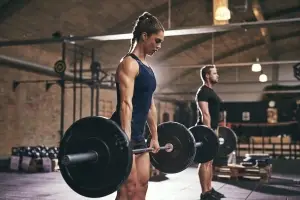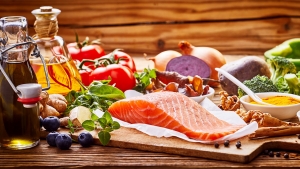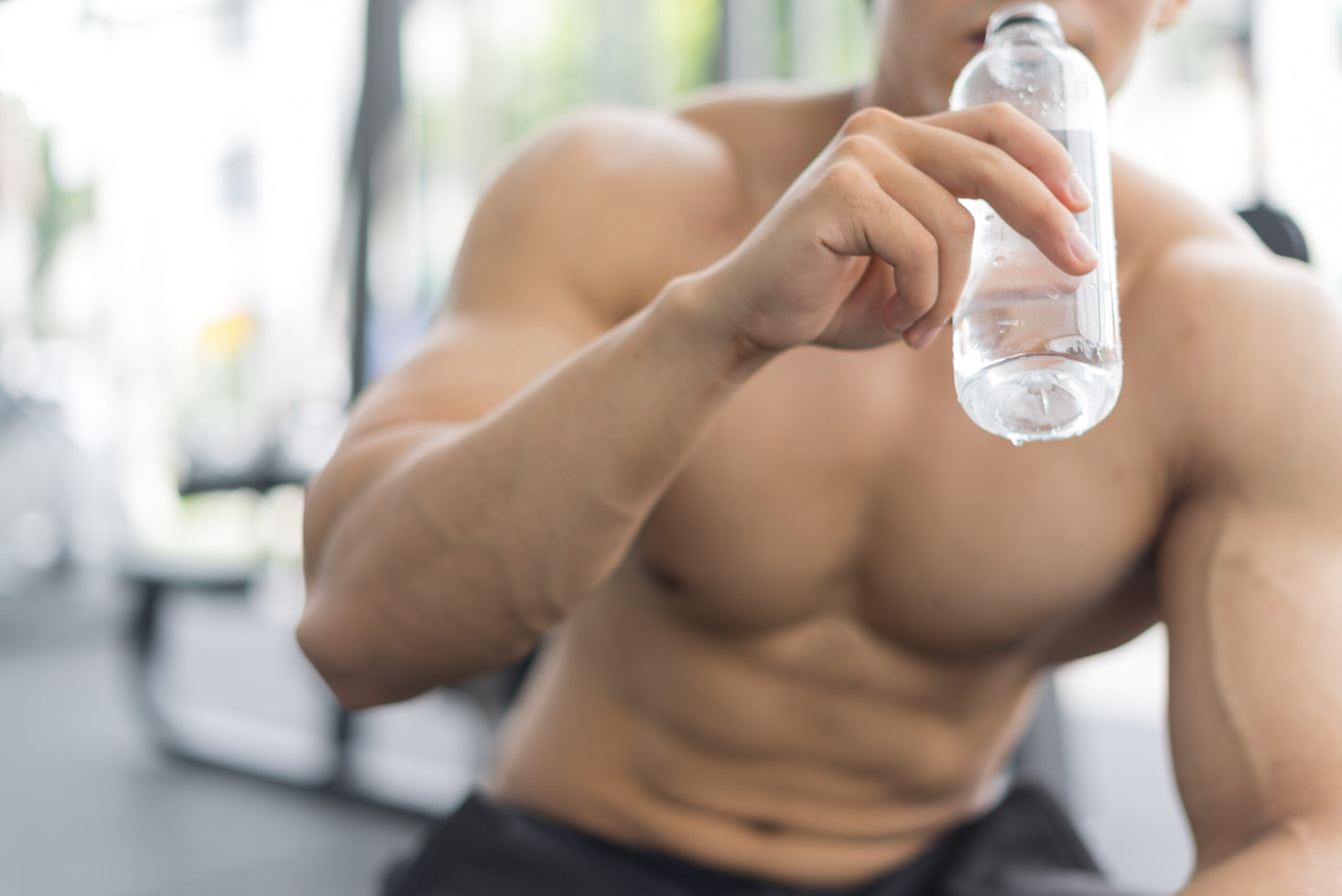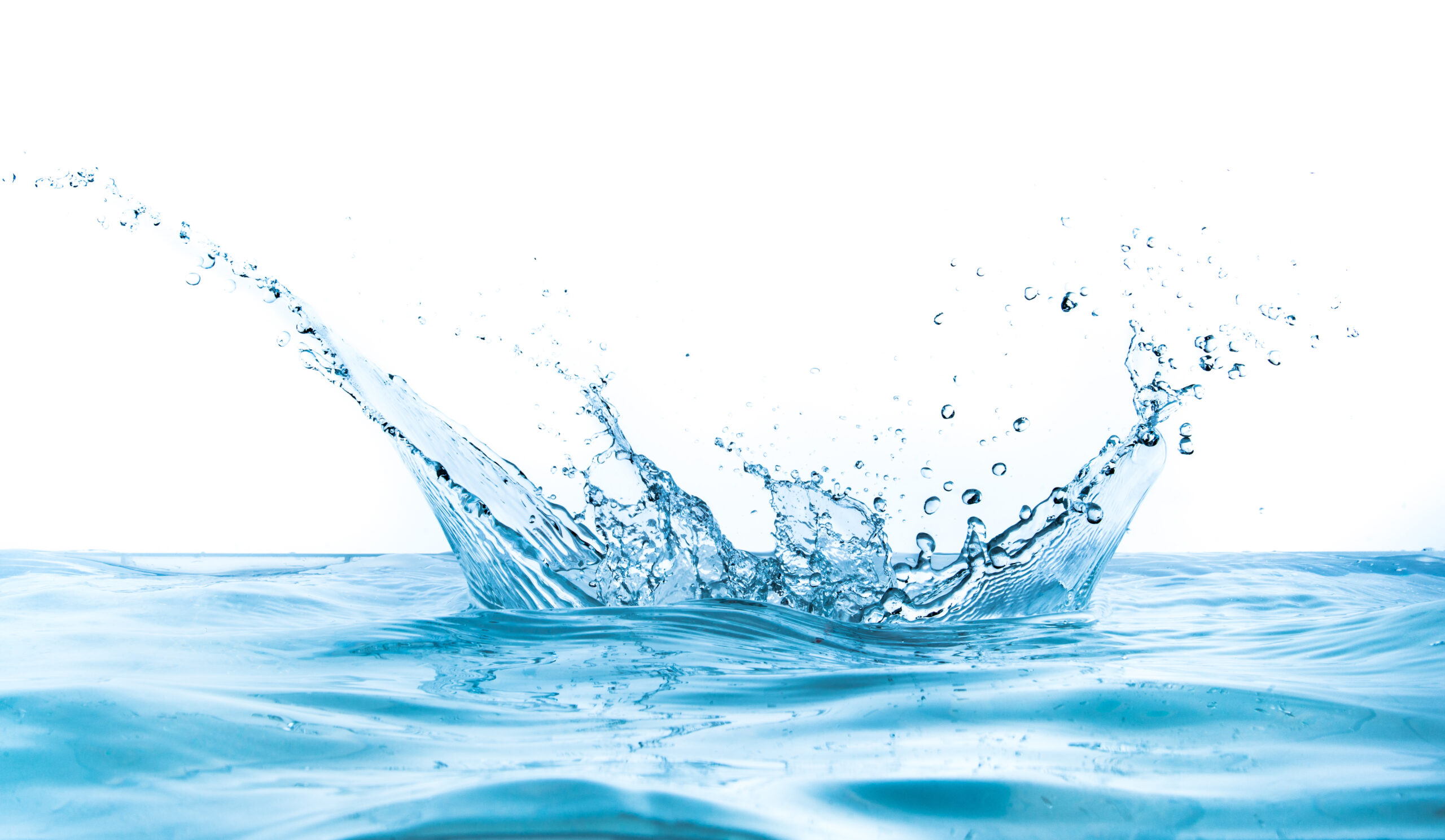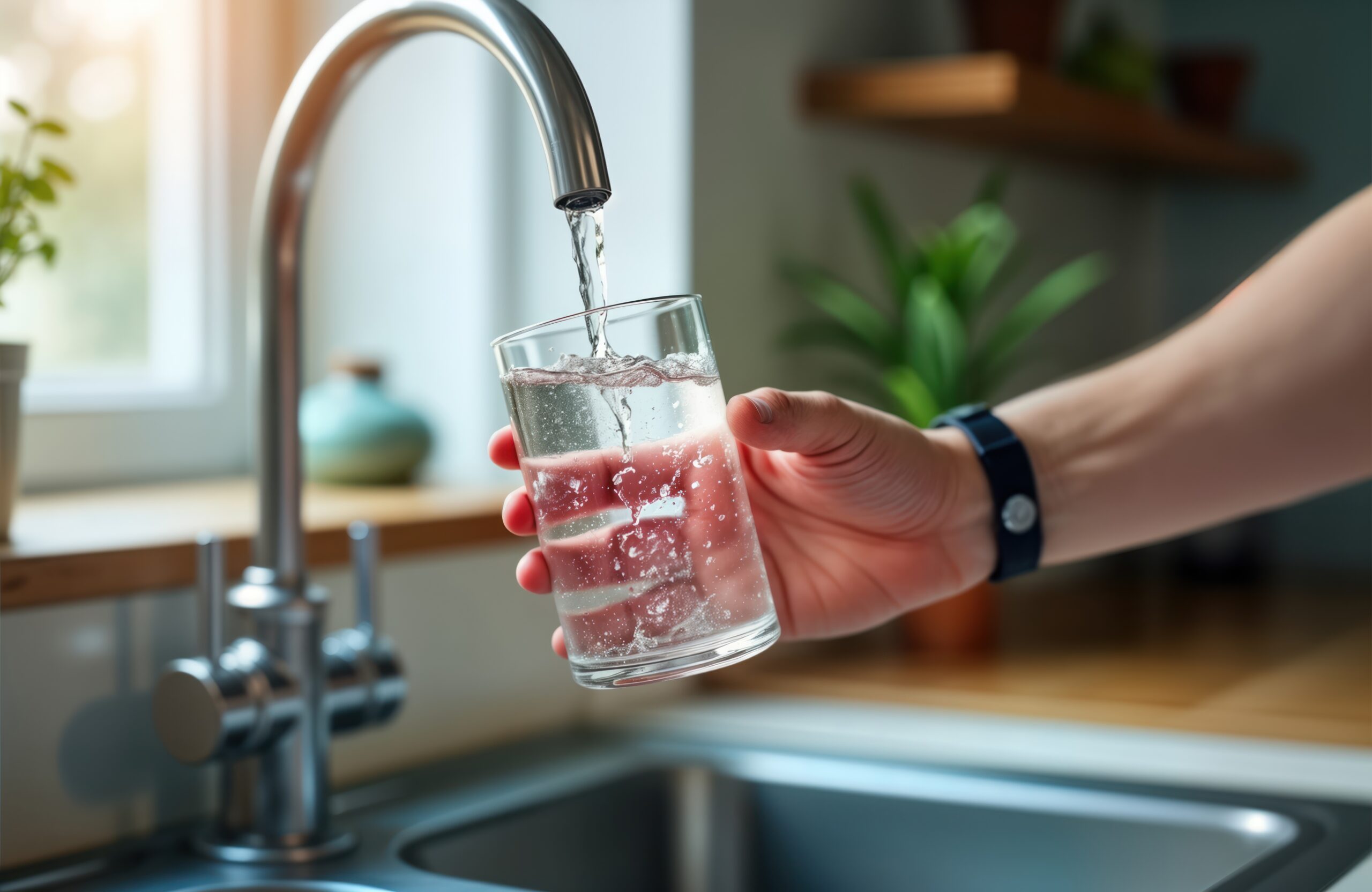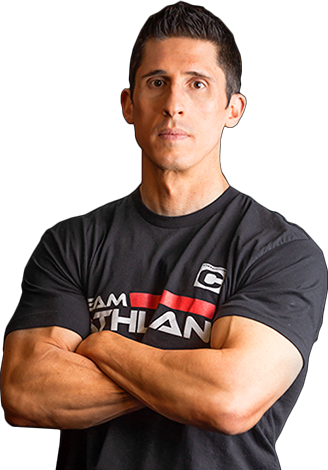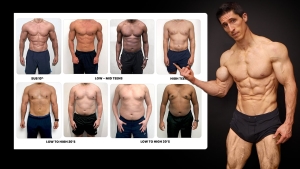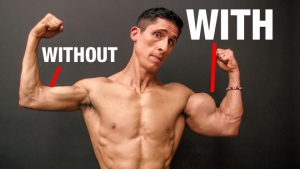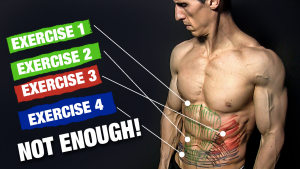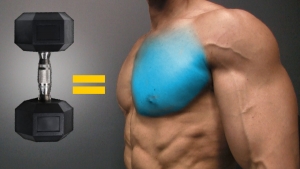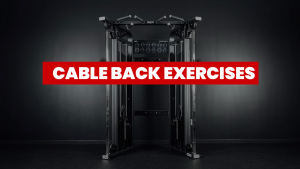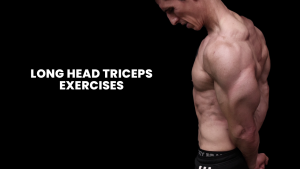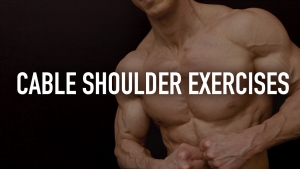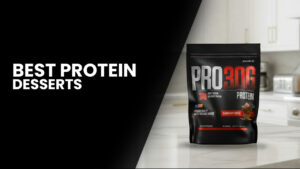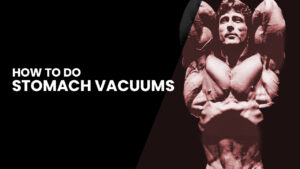The Water Intake Calculator below will give you an estimate of how many ounces of water you should drink per day based on your body weight, age, climate and activity level.
Fill out the details in the Water Intake Calculator below based on your current stats. Be as honest as possible about your actual activity level and climate so that you get the most accurate results.
Water Intake Calculator
HOW MUCH WATER SHOULD YOU DRINK?
“Just drink eight glasses of water a day.”
We’ve all heard this so-called common medical advice. But is it true for everyone?
This is one of the most frequently asked questions. The reality is that your real daily water intake depends entirely on you!
You have to take into account your body weight, activity levels, body temperature, and several other important factors.
For example, a few glasses of water might be okay if you’re sitting in an office all day, but it won’t cut it if you’re working outside in Florida… in July.
But is water really so important for sports nutrition that you need to track it?
Think about this: Even mild dehydration can tank your energy levels, mess with bodily function, and hurt mental performance.
And guessing your needs by random glasses of water is a fast track to underperforming in the gym and in life.
This is why we built a water intake calculator. We want to help you nail your hydration goal based on your body mass, physical activity, and other individual factors.
No more guesswork. Just the right amount of fluid intake for peak physical performance and recovery.
Let’s figure out how much water YOU really need and stop letting generic rules decide your water bottle refills.
HOW MUCH WATER SHOULD I DRINK PER DAY?
Here’s the first thing you need to know: there’s no single “perfect” number of cups of water or ounces of water per day that works for everyone.
Your daily water requirements depend on you, including your body size, your daily activity, and a whole list of additional factors that go way beyond grabbing a few glasses of water and calling it a day.
Let’s take a closer look at the key factors that determine how much water you need each day:
BODY WEIGHT / LEAN BODY MASS
The more you weigh, the more water you need. Period.
Bigger bodies have more blood volume, higher daily energy expenditure, and more surface area losing water through sweat and evaporation.
And if you’re carrying more lean muscle mass rather than just body fat, your needs go up even further because muscle tissue has higher water content than fat.
A 200-pound adult pushing hard in the gym will have drastically higher fluid intake requirements than someone who’s 50 pounds lighter even if they’re doing similar workouts.
That’s why many water intake recommendations use a simple starting rule: aim for about 0.5 to 1 oz of water per pound of body weight each day.
So, if you’re 200 pounds, that’s anywhere from 100 to 200 oz of water daily, depending on your activity patterns, climate, etc.
AGE
Your age changes everything about your hydration level.
Kids and teens have faster metabolisms, smaller body size, and sometimes lower awareness of thirst.
Older adults, on the other hand, often lose their natural thirst cues and have changes in kidney health that increase the risk of chronic mild dehydration, even if they feel fine.
Plus, older adults often take meds that can affect water loss or retention.
Maintaining adequate water intake is crucial for everyday health, healthy blood pressure, and even cognitive sharpness as you age.
SEX
Men generally have more lean mass and higher daily energy expenditure, which means higher water requirements for muscle repair, blood solute concentration, and cellular homeostasis.
With that said, women still need plenty of drinking water.
According to the National Academies of Sciences, Engineering, and Medicine (NASEM):
- Men need about 3.7 liters of water per day
- Women need about 2.7 liters of water per day
That includes plain water, other beverages, and water from food. These ranges help keep your body functioning, your brain sharp, and your muscles performing at their best.
ACTIVITY LEVEL
Your activity of choice can skyrocket your water intake requirements.
The harder you train, the more you sweat, and the more water your body burns through to cool you down and keep your blood flowing smoothly.
High-intensity or anaerobic activities like weightlifting, CrossFit, or interval sprints can cause major sweat losses, often around 0.5 to 1 liter per hour of hard training.
Add hot climates, and your total daily water intake goals climb even higher.
This is why a generic number of glasses of water isn’t enough. Your minutes per day in the gym dramatically shift how much water you should drink.
CLIMATE / TEMPERATURE
Living in hot climates? Expect higher water loss from sweat, even if you’re just walking around.
Even mild heat can increase your need for additional water, especially if you’re training outdoors or wearing heavy gear.
Cold or high-altitude conditions are sneaky. They might feel cooler, but they increase fluid intake requirements because of increased breathing rate and moisture loss from dry air.
Even a small bit of water lost here and there adds up fast.
PREGNANCY / BREASTFEEDING
Pregnant or breastfeeding? Your body’s working overtime and that means your hydration needs increase to keep you and your baby healthy.
In general, pregnant women need to add roughly 0.3 liters per day of fluid to their normal intake.
For women who are breastfeeding, they can tack on 0.7 to 1.1 liters per day extra because milk production demands serious water consumption.
Staying on top of your total daily water intake goals helps protect both you and your baby’s health, from blood pressure stability to cognitive function and proper nutrient delivery.
HEALTH CONDITIONS / MEDICATIONS
Certain medical conditions and medications can seriously crank up your water intake requirements.
If you’re dealing with fever or infections, your body burns through more fluid trying to regulate body temperature and fight off illness.
Vomiting and diarrhea causes fast, significant loss through sweat and fluid, leading to drops in blood volume and dangerous dips in hydration status.
Kidney issues like kidney disease or kidney stones change your body’s ability to hold onto water or flush out waste, altering how much fluid intake you need.
People with diabetes often experience higher water loss due to glucose pulling fluid into urine.
Now, let’s talk meds.
Diuretics (often prescribed for blood pressure) make you shed extra water and electrolytes.
Certain blood pressure drugs, laxatives, and other medications can also lead to more water loss than normal.
All of these factors can bump up your recommended daily water intake goals or require careful monitoring to avoid either dehydration or excessive water intake.
DIET
Your diet, both your beverage choices and the foods you eat, can massively influence how much water you need per day.
High-Protein or High-Fiber Diets
Protein and fiber are awesome for muscle growth and gut health but they’re water hogs.
Protein metabolism produces waste like urea, which flushes out with fluid intake.
Fiber pulls water into your digestive tract to keep things moving and prevent constipation.
That’s why high-protein or high-fiber eating demands additional fluid to avoid feeling sluggish, bloated, or backed up.
Salt (Sodium) Intake
Love salty snacks? High sodium levels raise your blood solute concentration, making your body hold onto water or, paradoxically, trigger thirst so you drink more to dilute those extra salts.
Proper hydration is critical to balance this out and keep your blood pressure stable.
Sugar-Sweetened Beverages
Sports drinks or soda are sugar-sweetened drinks that add plenty of calories but minimal hydration benefits.
They’re fine occasionally, but they’re no replacement for plain water when it comes to meeting your daily water intake goals.
Caffeinated Beverages
Caffeinated drinks like coffee, tea, and energy drinks still contribute to your total water consumption but they can slightly increase water loss in some people because caffeine has mild diuretic effects.
That doesn’t mean you have to avoid them but factor them into your daily water requirements and try not to let them be your only beverage of choice.
Even if you’re crushing your plain water goals, a diet stacked with salty foods, protein shakes, or constant caffeine can hike your need for additional water to stay in optimal hydration territory.
SO… HOW MUCH WATER DO YOU REALLY NEED?
Forget guessing games or random charts. Your water needs are personal and that’s why a water intake calculator exists.
Your perfect daily water intake depends on everything from your body size and training volume to climate, diet, and even life stages like pregnancy. No one-size-fits-all rule covers it.
That’s where a good water intake calculator comes in. It crunches your personal stats and daily drinking habits to tell you exactly how much water you should be drinking to keep your hydration level on point.
HOW TO USE THIS WATER INTAKE CALCULATOR
Hydration shouldn’t be guesswork. The human body demands precision if you want peak athletic performance, clear thinking, and solid recovery.
That’s why this water calculator is here. It will tell you exactly how much water you need for your life, not your neighbor’s or your lifting buddy’s.
Here’s how to dial in your daily intake like a pro:
STEP 1: ENTER YOUR WEIGHT OR LEAN BODY MASS
Start with your weight in pounds or, if you know it, your lean body mass.
More mass means higher body fluid shifts and greater energy requirements, so your daily water consumption needs to keep up.
Overall, a bigger body regardless of muscle mass or fat tissue means higher intake of water.
Even obese individuals have unique hydration calculators needs due to differences in body fat and body functions.
STEP 2: SELECT YOUR SEX
Men and women have different ideal hydration requirements because of differences in average body fat and muscle mass.
The NASEM recommends about 3.7 liters per day for men and 2.7 liters for women but those are just averages. Your true needs depend on your lifestyle.
STEP 3: ENTER YOUR AGE
As you age, your body’s thirst signals change, and your kidneys handle water differently.
The calculator adjusts your daily hydration goals so you avoid subtle levels of dehydration that can tank energy and blood glucose response.
STEP 4: CHOOSE YOUR ACTIVITY LEVEL
From light sweat walks to full-on sports medicine territory, your level of activity massively affects your recommended daily water intake goals.
The more you move and the higher the intensity, the more you’ll sweat. This means a higher fluid loss.
Even if you’re only training three times a week, your beverage intake still needs a boost compared to someone sedentary.
STEP 5: FACTOR IN CLIMATE OR TEMPERATURE
Warmer temperatures and hot climates spike sweat rates, raising your intake per day to replace lost fluids.
But don’t sleep on cold climates either. They can subtly increase water ingestion thanks to dry air and respiratory fluid loss.
This is why the calculator includes adjustments for climate, so you’re covered whether you’re training in Miami or Alaska.
STEP 6: ADD ADJUSTMENTS FOR PREGNANCY OR BREASTFEEDING
If you’re pregnant or breastfeeding, your body’s water demands shoot up to support extra body functions and fluid production.
The calculator adds that additional water, so you’re not left guessing.
BENEFITS OF STAYING HYDRATED
Staying on top of your daily water intake isn’t just about avoiding thirst. It’s the difference between hitting PRs and feeling wiped out halfway through a workout.
Hydration impacts how your muscles fire, how your joints move, how sharp your mind stays, and how efficiently your body burns fat.
Hitting your numbers from a daily water intake calculator isn’t optional. It’s how you keep your body performing at its best.
Here are the most cited hydration health benefits and why the right amounts of water matter for your training and overall health:
MUSCLE PERFORMANCE
Your muscles run on water. Adequate hydration keeps cells full, supports nutrient delivery, and prevents cramps that can shut down a workout.
A drop in your daily water intake can lead to weaker lifts, slower recovery, and lower athletic performance.
Even small dips in fluid can disrupt body requirements for muscle contraction and cause signs of dehydration like fatigue or muscle spasms.
JOINT HEALTH
Water acts like cushioning inside your joints. Without enough fluid, cartilage dries out and friction increases.
That means stiff knees, achy shoulders, and less mobility under heavy loads.
Staying on top of your daily water consumption helps your joints stay smooth and resilient so you can move through full ranges of motion without pain.
FATIGUE PREVENTION
Low water levels force your heart to pump harder to keep blood moving. That drains your energy intake faster and leaves you feeling wiped out.
Hydration helps maintain blood flow, regulates body temperature, and keeps you pushing through long training sessions.
Reaching your target ounces from the daily water intake calculator can keep your engine running strong.
MENTAL FOCUS
Even a small drop in hydration affects your brain’s ability to focus, process info, and make quick decisions.
Hydration helps control blood glucose response and keeps the mind sharp.
Staying on track with your intake of water can improve reaction time, memory, and overall mental sharpness so you stay locked in during training and work.
BODY TEMPERATURE REGULATION
Your body dumps heat through sweat to keep you cool. But that fluid has to be replaced.
If your water drinking calculator says you’re coming up short, your core temp can spike fast, leading to dizziness, fatigue, or worse.
Sufficient daily water intake helps regulate your core temp, even in warmer temperatures, so you can train harder without overheating.
POTENTIAL FAT LOSS AND APPETITE CONTROL
Hydration plays a part in controlling hunger signals. People sometimes confuse thirst for hunger, leading to extra calories from snacks or sweet drinks.
Drinking fresh water before meals can help manage appetite, support weight loss, and reduce cravings for sugar-sweetened beverages.
Filling up your reusable water bottle instead of grabbing 80-89% fruit juice or other sugary drinks cuts empty calories while keeping you hydrated.
BEST SOURCES OF HYDRATION
Hydration isn’t just about pounding one more glass of water. It’s about fueling your body the right way so your muscles fire, your joints stay pain-free, and your brain stays sharp.
Here’s how to cover your daily water intake from more than just your water bottle:
WATER (AND ELECTROLYTES)
No surprise here: fresh water should be your first line of defense against severe dehydration.
It’s calorie-free, easy to access, and keeps your body running without extra additives.
Aim to spread your water out over the day, not chugging all your ounces per day in one shot.
With that said, while plain water does plenty, it can fall short if you’re sweating heavily or training hard.
That’s where electrolytes come in. Electrolyte tablets or powders are easy ways to upgrade your water.
Drop a tablet into your sports water bottles or travel mugs, and suddenly you’ve got sodium, potassium, and other minerals that help maintain fluid balance, reduce cramping, and support nerve function.
This is crucial for replacing what’s lost in sweat and preventing signs of dehydration, especially in warmer temperatures or longer training sessions.
Even low-sugar sports drinks can help but avoid sweet drinks overloaded with sugar unless you’re in an endurance event and need quick carbs.
WET FOOD
About 20% of your daily water intake comes from the body through food. Don’t underestimate how much wet food (no baking tools required!) helps keep you hydrated.
Besides helping hydration, water-rich fruits and vegetables keep calorie needs in check and support weight management, digestion, and overall health.
Here are some of the best “wet food” water sources that you can incorporate into your diet to help with hydration:
Fruits:
- Watermelon
- Strawberries
- Oranges
- Cantaloupe
- Grapefruit
- Pineapple
- Peaches
- Blueberries
- Honeydew melon
- Plums
Vegetables:
- Cucumbers
- Lettuce
- Tomatoes
- Celery
- Zucchini
- Bell peppers
- Spinach
- Radishes
- Cauliflower
- Broccoli
It’s also important to note that soups and broths count as beverages with water and deliver extra electrolytes.
Be sure to include ample fruits, vegetables, and nutrient-dense foods to help with your individual water needs.
OTHER BEVERAGES
Coffee, tea, and milk all contribute to adequate water consumption, despite old myths.
They hydrate your body but watch out for excess sugar or caffeine, if your goal is optimal recovery.
Limit sweet drinks and sodas, which add calories without the benefits of water and can spike blood sugar levels.
HYDRATION MYTHS
Hydration is packed with bad advice that can wreck your training, stall recovery, or leave you dragging through the day.
Too many people follow generic rules without considering how individual water needs change with body size, workouts, and climate.
The truth is that the impact of water intake on your performance is huge and guessing wrong can cost you strength, focus, and health.
Let’s crush the biggest myths right now:
EIGHT GLASSES IS ENOUGH FOR EVERYONE
Forget the old “8 standard water glasses a day” rule. That’s a generic target that ignores your body size, training volume, and even climate.
A smaller person and a heavy lifter have completely different intake on energy intake and hydration demands.
Your needs might be way above or below eight glasses.
Use a solid plan and a daily water intake calculator to find your real target in ounces for women and men.
IF YOU’RE NOT THIRSTY, YOU’RE GOOD
Thirst kicks in after your body is already low on fluids.
By the time your mouth is dry, you’re showing a clear sign of dehydration that can tank your impact of water intake on performance and focus.
Don’t wait for the urge. Keep your fluids steady with plain water, electrolyte maintenance, and some ice cubes.
MORE WATER IS ALWAYS BETTER
Some people think an abundant water supply means they should drink gallons. Bad idea.
Water intoxication is when you overdo it by drinking too much water. This can mess with your blood sodium levels, leading to dangerous hyponatremia.
Hydration is about balance, not drowning your system. Stick to what your body data actually says you need for your size, training load, and recovery.
ALL DRINKS HYDRATE THE SAME
Not true. While many beverages with water count toward your total fluids, not all hydrate equally.
Drinks loaded with sugar or caffeine can mess with your water balance, spike insulin, and add empty calories that blow up your intake on energy intake goals.
Good old fashioned water (with electrolytes) remains your best choice for pure hydration without the baggage.
HYDRATION DOESN’T MATTER IF YOU’RE NOT WORKING OUT
Hydration isn’t just for the gym. Your body loses water all day through breathing, digestion, and even sitting still.
Skipping proper hydration affects your joints, brain, and metabolic processes even on rest days.
Proper hydration supports body functions around the clock, helping regulate everything from temperature control to energy intake and recovery.
Don’t save your water bottle for workout days only.
Don’t have a fully fleshed out nutrition and fitness program that can help you achieve the weight loss or weight gain you’re after? We can help! Check out our ATHLEAN-X programs to see which is the best fit for your goals and fitness level.
Hydration isn’t guesswork. It’s one of the simplest tools you have to boost performance, recovery, and health.
Stop following random rules and figure out exactly how much water you need.
Use the daily water intake calculator, stay consistent, and keep your body firing on all cylinders.
Don’t have a fully fleshed out nutrition and fitness program that can help you achieve the weight loss or weight gain you’re after? We can help! Check out our ATHLEAN-X programs to see which is the best fit for your goals and fitness level.

- “Eight glasses a day” is outdated. Your water needs depend on your current weight, training, climate, and diet quality.
- Hydration isn’t just for athletes. Your brain, joints, and metabolism all rely on proper fluid intake.
- Bigger bodies, more lean muscle, and intense training mean higher total daily water intake
- Aim for 0.5–1 oz of water per pound of body weight daily but adjust for workouts, heat, and other personal factors.
- Men typically need around 3.7 liters/day; women need about 2.7 liters/day, including water from food and drinks.
- High-protein, high-sodium, or high-fiber diets mean you’ll need extra fluids to stay balanced.
- Don’t forget wet foods like hydrating fruits and veggies since they can cover up to 20% of your daily intake.
- Training in heat or high altitude cranks up sweat losses. Plan for 0.5–1 extra liter per hour of intense activity.
- Electrolytes matter. Add electrolyte tablets or powders to your water during heavy sweating or long workouts to avoid cramps and keep nerve function sharp.
- More water isn’t always better. Overhydration (hyponatremia) is real and dangerous. Stick to your personal needs.
- Use our water intake calculator to dial in your perfect number and stop relying on random rules.
REFERENCES

